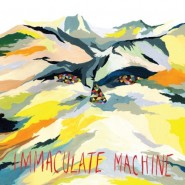 Immaculate Machine
Immaculate MachineHigh on Jackson Hill
Score: 54
Immaculate Machine has been around since 2003, and has been careful to release something each year, whether a full album or the occasional EP or 7″. This year the release is the full-length High on Jackson Hill. While it’s not an amazing album, Immaculate Machine does show off their ability to use their two guitars very well. At the same time, they clearly show their tendency towards huge amounts of repetition, and other devices that fail when used in such heavy excess.
High on Jackson Hill starts off with a very strong first track that seems to be a modern take on classic rock. Its strong primary guitar line (which the other instruments fit into very well, while still remaining unique) supports the entire track, which in turn let the vocals remain somewhat transient, and pleasantly underpresent when desirable. Even though Immaculate Machine has a very strong tendency towards heavy repetition, “Don’t Build the Bridge” remains entirely interesting though its use of numerous distinct sections that contrast just enough with one another.
“You Destroyer” is an equally excellent track, and it manages to remain entirely unique, not only when compared to the previous tracks, but to the rest of the album. While “Don’t Build the Bridge” focused almost entirely on the guitar as the primary line, the entire group takes a step back to let the two vocalists make a wonderful track with excellent lyrics: “too many cooks in the kitchen, too many kings on the throne,” and “how can I make it clear / I am not the wrecking ball / how can I make you understand / you are your own destroyer.” But while there are a few other very strong tracks in addition to these two, for example, the relaxed “Blurry Days,” and “Primary Colours,” which has very interesting instrumentals, and equally interesting, if amusing vocals, there are many, many mediocre or worse tracks on High on Jackson Hill
While at some points the vocals are melodic and well-pitched, they occasionally slip into less musical varieties, such as the shrieking on “Primary Colours” and the falsetto cries of “hoo-hoo-hoo” on “Neighbors Don’t Mind.” However, when the vocals work, they’re well-backed by the instrumentals, though the often extremely repetitive sounds would often not stand without the vocals.
So while the instrumentals are usually solid, they occasionally overwhelm tracks, resulting in a certain degree of indistinguishability. This occurs especially often during the repetitive sections of tracks, which Immaculate Machine is rather prone to including. This repetition carries over to the lyrics, which, on several tracks, degrade into the echoing of the same phrase for far too long. While this works on stronger tracks such as “Sound the Alarms,” on tracks with a weaker lyrical premise such as “Thank Me Later,” the repetition of the title phrase becomes rather overwhelming.
The lyrically strong parts of High on Jackson Hill, such as the opening track “Don’t Build the Bridge,” “You Destroyer,” as well as “I Know It’s Not as Easy,” stand in ample contrast with tracks which fail to assert themselves lyrically, such as the humorous “Only Love You For Your Car,” “Neighbors Don’t Mind,” and the amusing “He’s a Biter.” These latter tracks are less successful lyrically both for the aforementioned issue with repetition as well as for weaker underlying concepts.
While High on Jackson Hill certainly contains some strong tracks, it’s blemished by a rather large number of mediocre tracks, as well as a few that are even worse. While Immaculate Machine displays inspiration in some parts of their musical repertoire, they too often fall back on repetition or other unsuccessful musical devices. Overall, High on Jackson Hill isn’t a bad album, but it’s not a great album either.
This post is tagged 50-59, Immaculate Machine